
Problems view
The Problem view bolsters your threat modeling by providing visibility into the risks your projects face. Use the Problem view to highlight the vulnerabilities your application faces and gain insight into the Tasks that have been assigned to you based on the Project Survey.
Access the Problems view
-
The user is a member of the project and has the permission Project Roles→Project Management→View Project.
Access the Problems view to see all Problems assigned to your Project by the Project Survey. Problems are automatically sorted by Risk Rating.
-
From the Business Units menu, access your project.
-
Select the Problems tab to see a list of all Problems associated with your Project.

-
Search by Problem ID or keywords in the title, description, or related Task titles, and filter by Risk Rating (see 1 on the image below).
-
Select whether you would like to show only tasks from a relevant risk policy (see 2 on the image below).
-
Select the Description icon to see the Problem’s description (see 3 on the image below).
-
Select the Related Tasks icon to see the number of Tasks related to this Problem and the titles of related Tasks (see 4 on the image below).

From this view, you can also access the Task details for Related Tasks by clicking on the Task title.
Update Related Tasks
-
The user is a member of the project and has the permission Project Roles→Project Management→View Project.
From Related Tasks under the Problems view, you can see Tasks related to a particular Problem assigned to your Project. From this view, you can update the status of a Task or assign users.
-
From the Problems tab, select a Problem from the table and click on the Related Tasks icon.

-
From Related Tasks, you can modify the status of a Task by clicking on the Task status icon.

-
From Related Tasks, you can also assign users to the Task by clicking on the person icon (see 3 on the image below).

Once you modify a Task status or add users for one Task, you can continue onto the next in the list or select another Problem.
Add a Library Problem to the Project
From the Project View, you can add a Problem from the SD Elements Library to your Project. Use this when you want to add a Problem that is not related to your Project Survey settings.
-
The user is a member of the project and has the permission Project Roles→Project Management→Edit Project Details.
-
From the Business Units menu, access your project.
-
Select the Problems tab to see a list of all Problems associated with your Project.
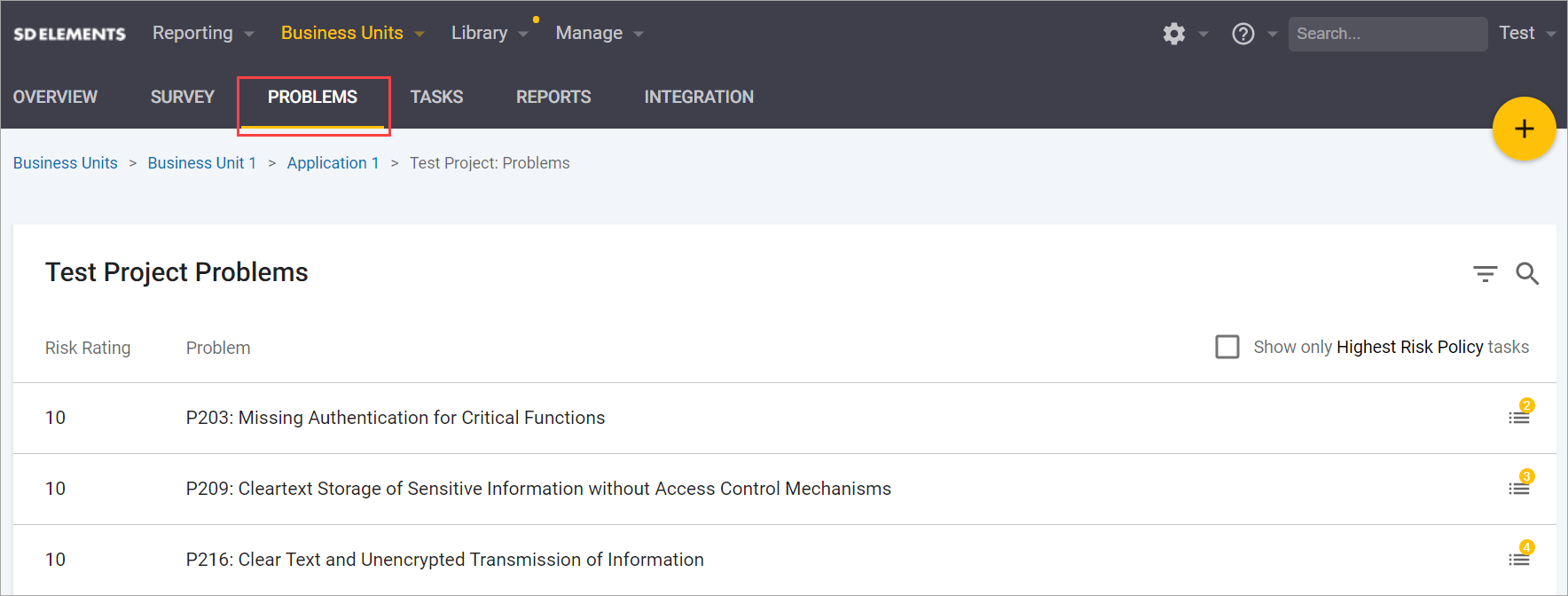
-
Click the plus [add circle] button.
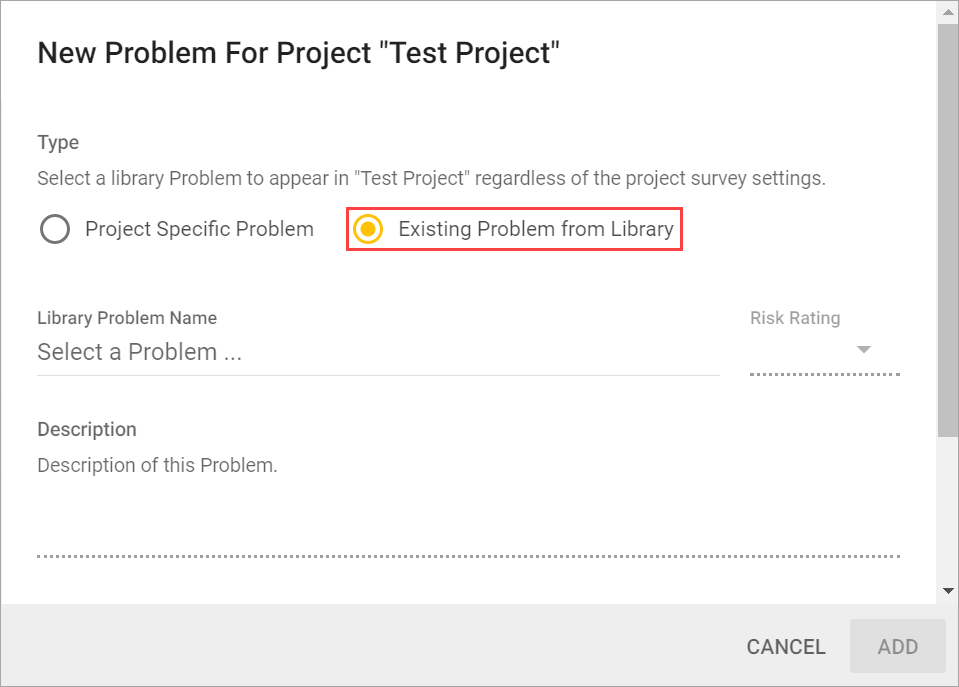
-
Select a Library Problem from the dropdown list or type a search query.
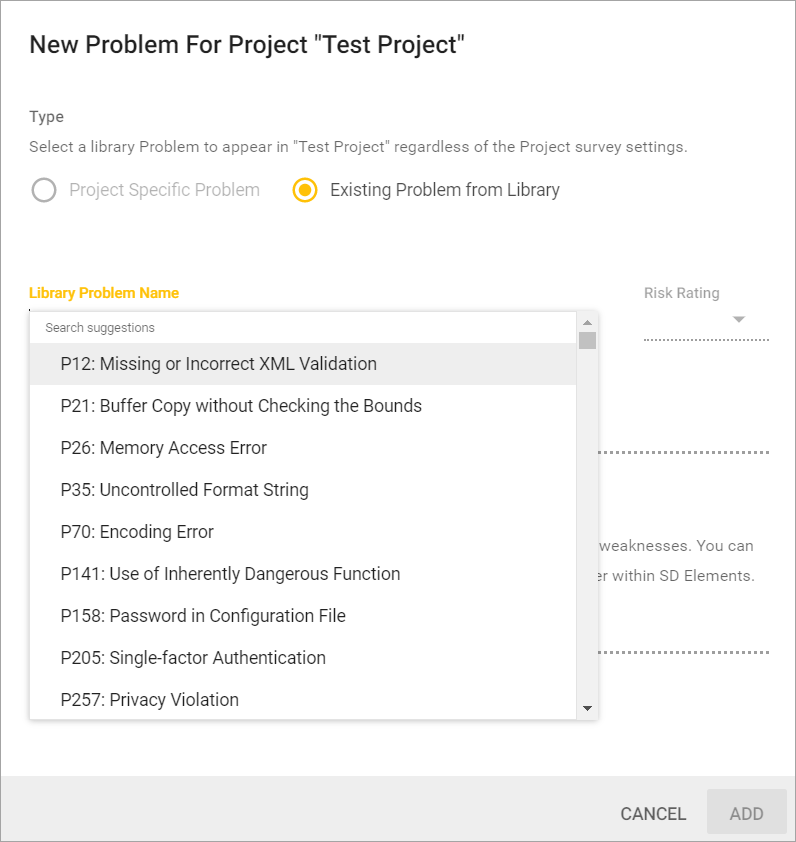
-
Click on Add.
The Library Problem is added to your project. Note that you cannot modify the contents of a Library Problem from this view.
Remove a Library Problem from the project
-
The user is a member of the project and has the permission Project Roles→Project Management→Edit Project Details.
-
From the Business Units menu, access your project.
-
Select the Problems tab to see a list of all Problems associated with your Project.
-
Hover the cursor over the Problem you want to delete and click on the button to remove a manually added Library Problem.

-
Confirm that you want to remove the Problem with the warning dialogue.
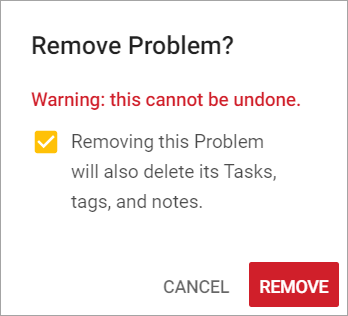
-
Click Remove.
The manually added Library Problem and its Tasks, tags, and notes are removed from your project.
Add a Project Specific Problem to the Project
From the Project View, you can create a Problem specific to your project that does not exist in the SD Elements Library. Use this when you want to create and add a new Problem on the fly that is relevant to your current project.
-
The user is a member of the project and has the permission Project Roles→Project Management→Edit Project Details.
-
From the Business Units menu, access your project.
-
Select the Problems tab to see a list of all Problems associated with your Project.

-
Click the plus [add circle] button.
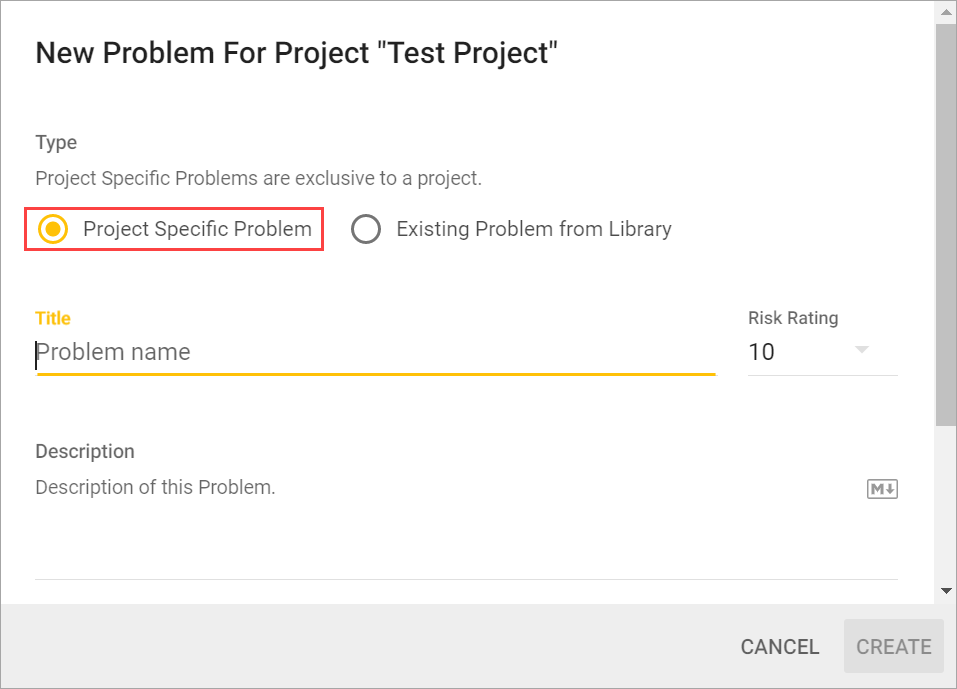
-
Create a Problem by filling in the fields:
-
Problem name: The name of the Problem.
-
Risk Rating: Select a risk rating from 1-10, where a higher number denotes more risk.
-
Description: The explanation of what this Problem addresses with relevant definitions of terms and concepts as required.
-
Common Weakness Enumeration Identifier (Optional): Search or select a CWE from the list.
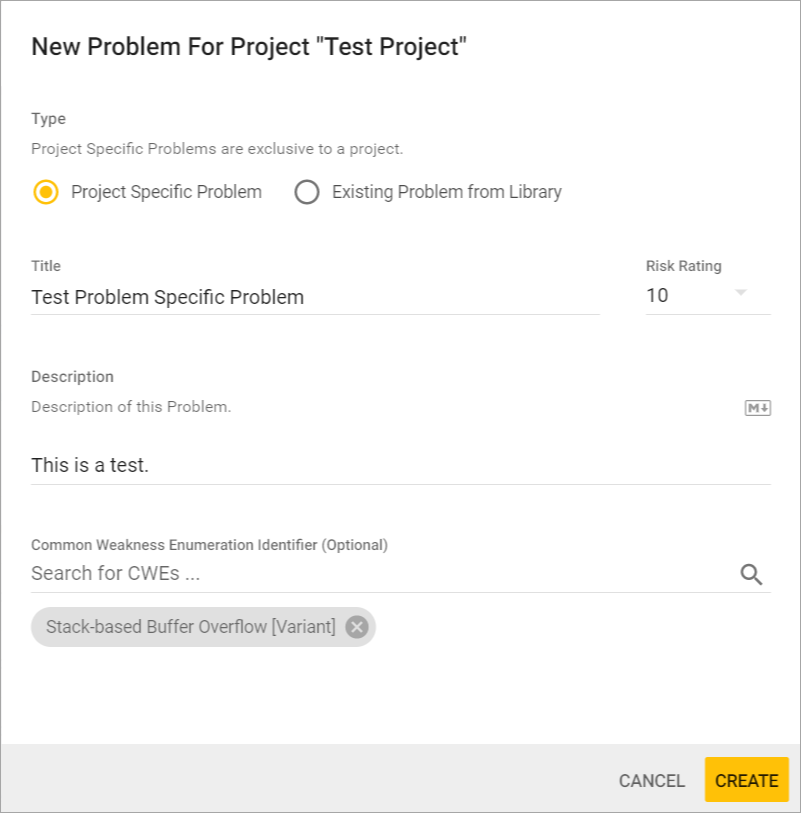
-
-
Click on Create.
The new Problem is created and added to your project’s list of Problems. You may click on the edit icon to update any fields.
Remove a Project Specific Problem from the Project
-
The user is a member of the project and has the permission Project Roles→Project Management→Edit Project Details.
-
From the Business Units menu, access your project.
-
Select the Problems tab to see a list of all Problems associated with your project.
-
Hover the cursor over the Problem you want to delete and click on the button to remove a Project Specific Problem.

-
Confirm that you want to remove the Problem with the warning dialogue.
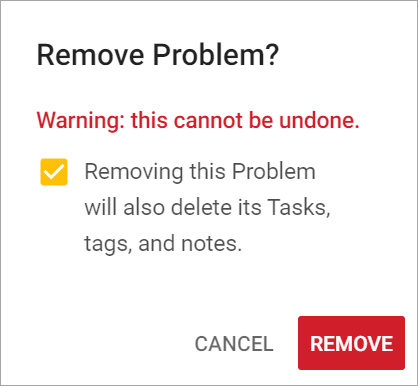
-
Click Remove.
The Project Specific Problem is removed from your project.
Filter Problems
-
The user is a member of the project and has the permission Project Roles→Project Management→View Project.
The project filter can be used to search for Problems matching certain criteria. It is also useful to help prioritize which problems to focus on. For instance:
-
"Find Problems with high risk and have tasks that are high priority"
-
"Find Problems that have incomplete Tasks"
-
"Find Problems that should be assigned to manual testers"
-
Click on the filter [filter list] icon in the top right of the page.

-
Use one or more of the options to filter the Problems. Filtering Problems by Problem risk rating, Problem source, assigned user, Task priority, and Task status is supported.
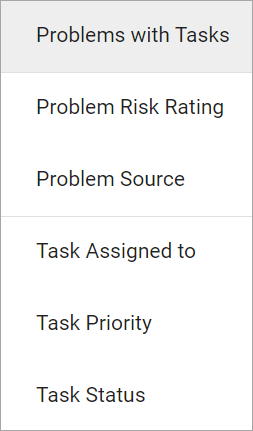
The Problems are now filtered based on your selection.
Carry over Project Problems
You can transfer Project Problems to new releases using Advanced options.
-
From the Business Units menu, access your project.
-
Click on the Overview tab.

-
Click on the More options icon and select New Release.
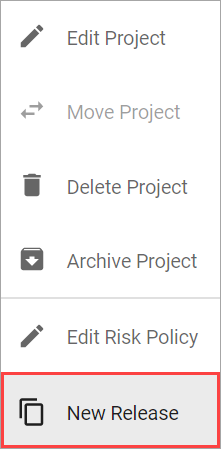
-
From the New Release pop over menu, select Project Specific Problems Retention.
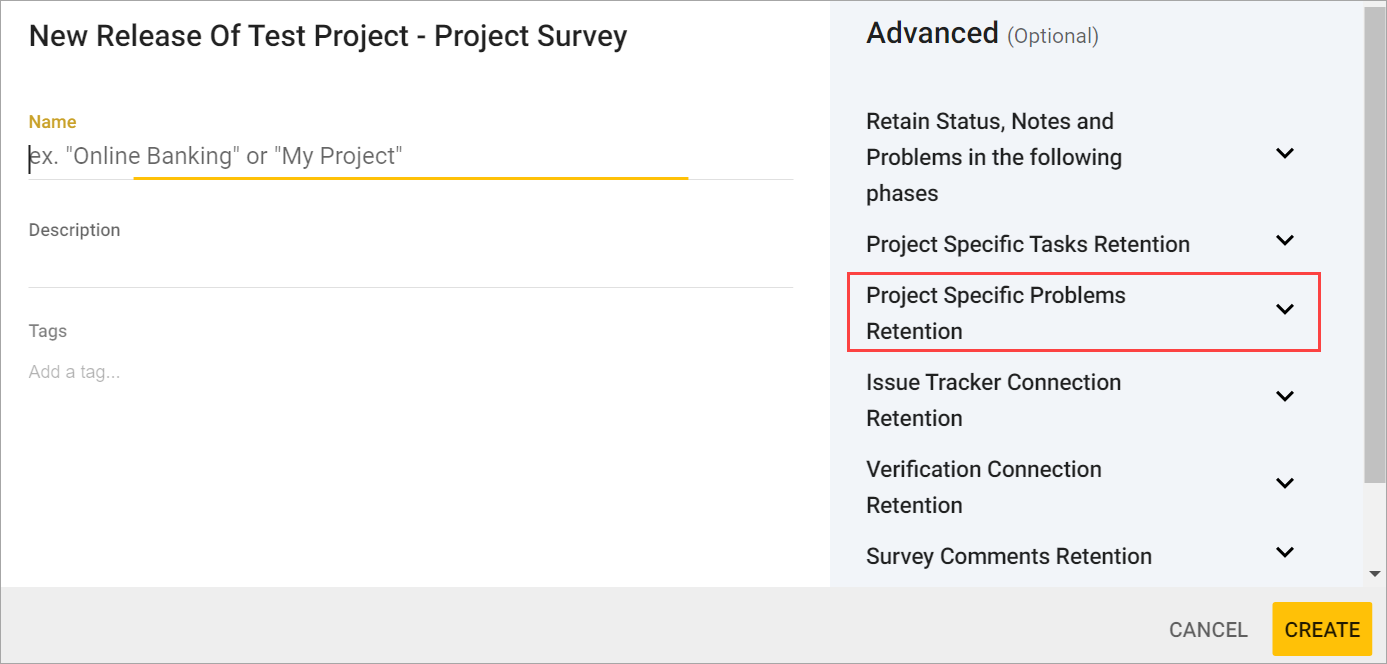
-
Check off the option to Carry over all Project Specific Problems.
-
Optionally, you can choose to carry over related Task statuses by checking the secondary box.
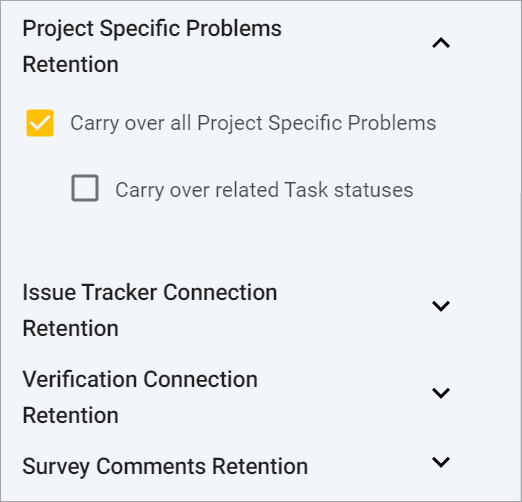
-
-
Click Create.
Your Project Problems (and, optionally, your Task statuses) are carried over to the new release.
